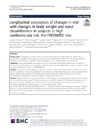Please use this identifier to cite or link to this item:
https://accedacris.ulpgc.es/jspui/handle/10553/70160
| Title: | Longitudinal association of changes in diet with changes in body weight and waist circumference in subjects at high cardiovascular risk: The PREDIMED trial | Authors: | Konieczna, Jadwiga Romaguera, Dora Pereira, Veronica Fiol, Miguel Razquin, Cristina Estruch, Ramón Asensio, Eva M. Babio, Nancy Fitó, Montserrat Gómez-Gracia, Enrique Ros, Emilio Lapetra, José Arós, Fernando Serra-Majem, Lluís Pintó, Xavier Toledo, Estefaniá Sorlí, José V. Bulló, Monica Schröder, Helmut Martínez-González, Miguel A. |
UNESCO Clasification: | 3206 Ciencias de la nutrición 320501 Cardiología |
Keywords: | Body Weight Dietary Intake Longitudinal Study, Repeated-Measures Data The Predimed Trial Waist Circumference |
Issue Date: | 2019 | Journal: | International Journal of Behavioral Nutrition and Physical Activity | Abstract: | Background: Consumption of certain foods is associated with long-term weight gains and abdominal fat accumulation in healthy, middle-aged and young, non-obese participants. Whether the same foods might be associated with changes in adiposity in elderly population at high cardiovascular risk is less known. Objective: Using yearly repeated measurements of both food habits and adiposity parameters, we aimed to investigate how changes in the consumption of specific foods were associated with concurrent changes in weight or waist circumference (WC) in the PREDIMED trial. Design: We followed-up 7009 participants aged 55-70 years at high cardiovascular risk for a median time of 4.8 years. A validated 137-item semi-quantitative Food Frequency Questionnaire was used for dietary assessment with yearly repeated measurements. We longitudinally assessed associations between yearly changes in food consumption (serving/d) and concurrent changes in weight (kg) or WC (cm). Results: Yearly increments in weight were observed with increased consumption (kg per each additional increase in 1 serving/d) for refined grains (0.32 kg/serving/d), red meat (0.24), potatoes (0.23), alcoholic beverages (0.18), processed meat (0.15), white bread (0.07) and sweets (0.04); whereas inverse associations were detected for increased consumption of low-fat yogurt (-0.18), and low-fat milk (-0.06). Annual WC gain (cm per each additional increase in 1 serving/d) occurred with increased consumption of snacks, fast-foods and pre-prepared dishes (0.28), processed meat (0.18), alcoholic beverages (0.13), and sweets (0.08); whereas increased consumption of vegetables (-0.23), and nuts (-0.17), were associated with reductions in WC. Conclusions: In this assessment conducted in high-risk subjects using yearly repeated measurements of food habits and adiposity, some ultra-processed foods, refined carbohydrates (including white bread), potatoes, red meats and alcohol were associated with higher weight and WC gain, whereas increases in consumption of low-fat dairy products and plant foods were associated with less gain in weight and WC. | URI: | https://accedacris.ulpgc.es/handle/10553/70160 | ISSN: | 1479-5868 | DOI: | 10.1186/s12966-019-0893-3 | Source: | International Journal of Behavioral Nutrition and Physical Activity [ISSN: 1479-5868], v. 16 (1), Diciembre 2019 |
| Appears in Collections: | Artículos |
SCOPUSTM
Citations
32
checked on Jun 8, 2025
WEB OF SCIENCETM
Citations
33
checked on Feb 15, 2026
Page view(s)
107
checked on Jan 10, 2026
Download(s)
115
checked on Jan 10, 2026
Google ScholarTM
Check
Altmetric
Share
Export metadata
Items in accedaCRIS are protected by copyright, with all rights reserved, unless otherwise indicated.
